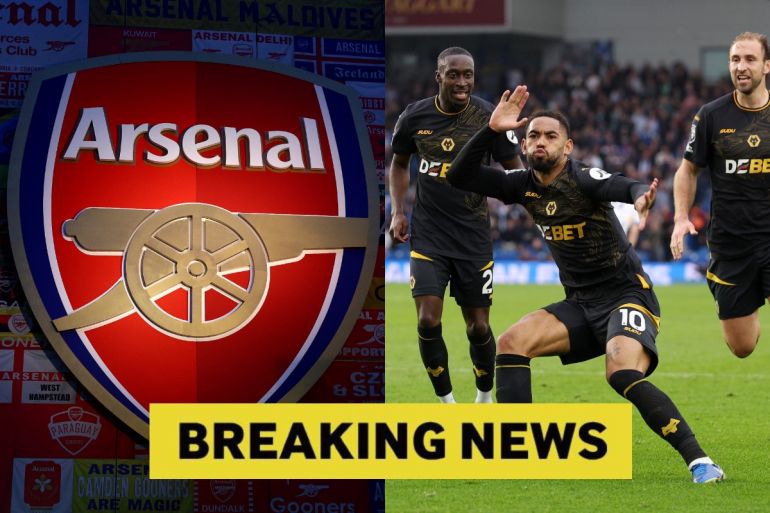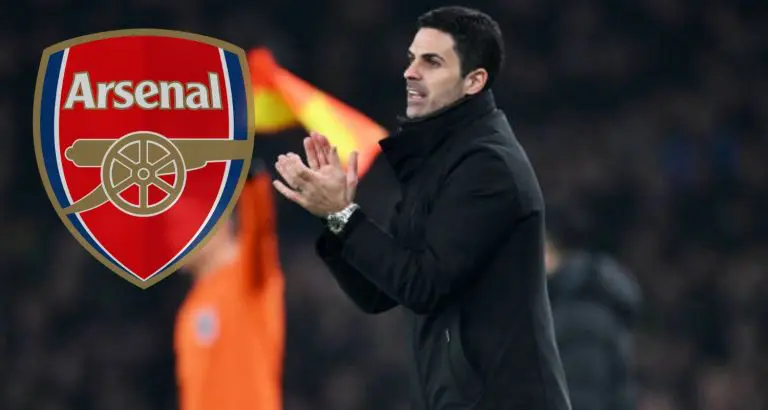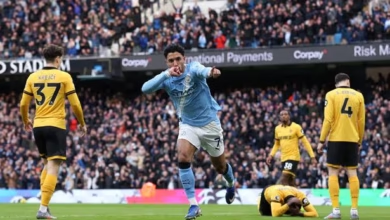Deal getting messy: Premier League star agrees terms with Arsenal but there’s a catch…

Arsenal’s pursuit of Wolverhampton Wanderers forward Matheus Cunha has reportedly become a complicated and messy situation, with numerous twists and turns making it a captivating transfer saga. While Arsenal has reportedly agreed to personal terms with Cunha, the transfer process has been far from smooth, with several factors complicating the move. According to a reliable source on the platform X (formerly Twitter) under the account ‘Teamnewsandtix,’ the Gunners and Cunha have agreed on terms, but the situation is far from straightforward. In a significant twist, Cunha has also verbally agreed to a new contract with Wolves, adding a layer of complexity to an already challenging deal.
This development has led to a tense and unpredictable situation that has kept both the footballing world and fans guessing about Cunha’s future. To understand why this transfer has become so messy, it’s important to delve into the various factors at play, including Cunha’s initial stance on staying at Wolves, Arsenal’s ambitions, and the broader context of the Premier League transfer window. Furthermore, Arsenal’s pursuit of other top names, including players like Benjamin Sesko, Alexander Isak, and Viktor Gyökeres, adds another layer to this developing story.
In the early stages of the January transfer window, Cunha’s future seemed to be set in stone—at least for the time being. Several reports had suggested that the Brazilian forward had no immediate intention of leaving Wolves, with some even indicating that he was open to signing a new contract with the club. Wolves had reportedly been working on an extension for Cunha, potentially with a release clause, which would allow him to move on in the future, but it seemed like the player was willing to stay and see out the season.
This was a crucial time for Cunha as he had been a key figure in Wolves’ attack, and the club was looking to retain its best players as they continued their fight to avoid relegation from the Premier League. As the team struggled near the bottom of the table, Cunha’s presence remained vital for the club’s survival hopes. Wolves, under manager Julen Lopetegui, had no immediate plans to part with the player, especially during the middle of the season when survival was the primary objective. Therefore, the news that Cunha was considering staying at Molineux was not entirely surprising, and it appeared as though the forward was ready to see out the season before making a move, potentially in the summer.
However, things quickly began to shift as Arsenal showed increasing interest in Cunha, which ultimately changed the dynamics of the situation.
Arsenal’s interest in Cunha became more apparent as the Gunners looked to bolster their attacking options in the January transfer window. With the club competing on multiple fronts this season—domestically in the Premier League and in Europe through the Champions League—Arsenal was keen to strengthen their squad. The club’s manager, Mikel Arteta, has been known for his strategic planning and depth in squad rotations, and Cunha seemed like a player who could offer both flexibility and attacking prowess in the forward areas.
Arsenal’s interest was further fuelled by Cunha’s impressive performances for Wolves, despite their struggles. The Brazilian forward had showcased his qualities in the Premier League, including his ability to link up play, his pace, and his technical skills. These qualities made him an appealing prospect for Arsenal, who have a history of signing versatile attackers. Cunha’s ability to play across the front line, coupled with his experience in the Premier League, made him an intriguing option for the Gunners.
Reports surfaced suggesting that Arsenal had not only made their interest known but had already agreed to personal terms with Cunha. This was a significant development, as it showed that the club was serious about securing his services. Given the ongoing competition at the top of the Premier League, Arteta needed reinforcements, and Cunha appeared to be a solid option for the attack, adding more depth to the squad in the crucial second half of the season.
However, this move was complicated by Cunha’s existing relationship with Wolves, where he was still under contract. The verbal agreement to sign a new contract with the club, which had reportedly been in place before Arsenal made their move, only added to the complexity of the situation. While Cunha may have been open to a move to Arsenal, his commitment to Wolves, especially in such a critical season for the club, created a tangled web of negotiations.
As Arsenal continued to push for Cunha’s signature, the situation became more complicated. The player, who had initially seemed content to stay at Wolves and even sign a new contract, was now facing a dilemma: stay at Molineux and continue his work with the club, or take a significant step up to join one of the top clubs in England, competing for league titles and European glory. This internal conflict made the situation “messy,” as described in various reports.
Cunha’s head was seemingly turned by the opportunity to join Arsenal, a club on the rise with aspirations of winning silverware this season. As the transfer window progressed, the Brazilian forward reportedly began doing everything in his power to facilitate the move to North London. However, with Wolves unwilling to let go of such a key player mid-season, particularly when relegation was a very real threat, the deal began to feel increasingly uncertain.
The player’s desire for a move to Arsenal became more evident as the saga unfolded, but there were significant obstacles to overcome. Arsenal had made their intentions clear, and Cunha had reportedly agreed to personal terms, but the difficulty remained in convincing Wolves to sell. The club’s survival in the Premier League was at stake, and losing a player of Cunha’s ability during the January window would weaken their chances of staying in the top flight.
For Arsenal, the situation also became tricky. The club had other priorities, including preparing for the return of Champions League football, with crucial fixtures on the horizon. Arsenal’s immediate focus was on their upcoming match against Dinamo Zagreb in the Champions League, which would require the squad’s full attention. While fans eagerly anticipated Cunha’s potential arrival, it was clear that Arsenal could not afford to get distracted by one player’s transfer saga. The club had a busy and important few weeks ahead, and the potential signing of Cunha needed to fit into their broader plans.
Wolves’ position in this transfer drama remained a significant factor in the overall outcome. The club was in a precarious position in the Premier League, facing the threat of relegation. As such, losing key players like Cunha could have disastrous consequences for their survival hopes. With manager Julen Lopetegui fighting to keep the club in the top flight, it made sense for Wolves to resist selling their star forward during the January window.
While the financial aspect of the deal could be tempting, particularly if Arsenal offered a substantial transfer fee, the loss of Cunha would create a void in the Wolves attack that would be difficult to fill midway through the season. Relegation would not only have a financial impact on the club but also severely affect their ability to attract and retain top players in the future. This made the decision to let Cunha go more challenging, despite his reported desire to move.
Wolves were, therefore, in a difficult position: keep a key player during a crucial season but risk losing him for a lower fee later on, or sell him now and face the risk of relegation without their star forward. The club had to balance short-term survival with long-term financial considerations, which added another layer of tension to the transfer negotiations.
As the transfer window continued, Arsenal’s interest in Cunha was not the only forward they were linked with. Other high-profile names were also reportedly on the club’s radar, including Benjamin Sesko, Alexander Isak, and Viktor Gyökeres. These players were also seen as potential targets for Arsenal, with Sesko and Isak both enjoying strong seasons in their respective leagues. The Gunners’ interest in these players added another level of intrigue to the Cunha saga, as it seemed that Arteta and the club were exploring multiple options to strengthen their attack.
Benjamin Sesko, in particular, had been linked with a move to top clubs across Europe, and his potential arrival at Arsenal would have been a significant statement of intent. Alexander Isak, meanwhile, had already made a name for himself in the Premier League with Newcastle, and his style of play could have been a perfect fit for Arsenal. Similarly, Viktor Gyökeres was a player who had impressed with Coventry City and seemed like a realistic option for the Gunners. With multiple forwards on the radar, Arsenal had a range of options, which made the pursuit of Cunha even more competitive.
Despite these other potential targets, it was clear that Arsenal had placed significant emphasis on securing Cunha’s signature. His versatility, experience in the Premier League, and ability to play across the front line made him an appealing option for the Gunners as they aimed to strengthen their squad for the second half of the season.
As the transfer window continued, it was evident that the situation surrounding Matheus Cunha would remain a key talking point. While Cunha was reportedly eager to move to Arsenal, the complexities of the transfer were unlikely to be resolved easily. Arsenal’s desire to strengthen their attack was clear, but whether or not Cunha would be the player to join them remained uncertain.
Wolves, for their part, would likely continue to resist selling their star player unless an irresistible offer came their way. The club’s survival in the Premier League was at stake, and losing Cunha in the middle of the season would significantly weaken their chances of staying up. For Arsenal, the challenge was to maintain focus on their immediate goals—Champions League qualification, Premier League success, and silverware—while navigating the unpredictable transfer market.
Ultimately, the future of Matheus Cunha’s transfer saga will depend on several factors, including Wolves’ willingness to sell, Cunha’s desire to move, and Arsenal’s ability to negotiate a deal that benefits both parties. The coming days and weeks will likely reveal whether Cunha will make the move to the Emirates Stadium, but for now, the transfer remains an exciting and messy situation to follow.















